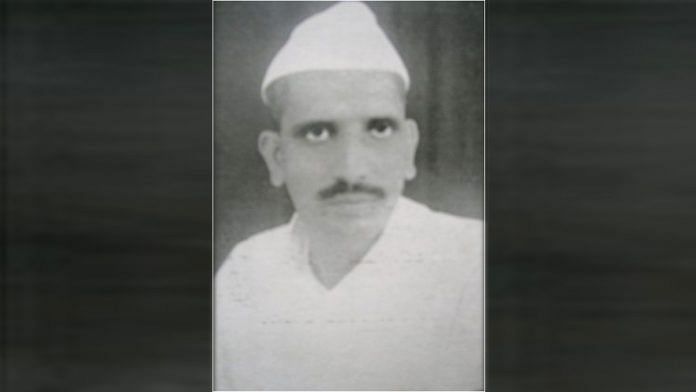Gokulbhai Bhatt, who quit college to join the non-cooperation movement, was a staunch proponent of the Gandhian Panchayati Raj.
In November 1948, Gokulbhai Bhatt, a member of the Constituent Assembly, called a draft of the Indian Constitution un-Indian. As a committed Gandhian, Bhatt was deeply pained by the omission of a Panchayati Raj governance structure in the constitution.
It took the country over 40 years to address his objections. And seven decades after Independence, India still remains a largely rural society with the Panchayati Raj system at the heart of its governance structure.
Also read: Hiralal Shastri, the man who pushed for equal rights within Constituent Assembly
Role during India’s freedom struggle
Born on 19 February 1898 in Sirohi, Rajasthan, Bhatt’s dormant nationalism awakened when he was a matriculation student in Bombay (now Mumbai).
One day, while returning home, he observed an Englishman who wanted to take a walk frantically trying to open a garden’s gate. He finally kicked it open and then slapped the gardener. As Bhatt approached the gate, he noted that the opening time for the garden was later. This incident in 1917-1918 created a profound impact on Bhatt.
Incensed, he wrote a letter to the editor of The Bombay Chronicle narrating the entire episode. Later, he read out the published version to the gardener as well.
Recounting it later, he wrote in an essay, “I did not know who that Englishman was. There was British rule in India and any foreigner could dominate over us, we were slaves; because we were ruled by others they would dare to beat up a black Indian who was even innocent.”
After that incident, Bhatt devoted himself completely to India’s freedom struggle. He started out by participating in protests and then gave up college to join the non-cooperation movement. After getting elected as a delegate to the Ahmedabad Congress of 1921, he came in contact with Mahatma Gandhi who became a lifelong influence.
Expressing his emotions during this period, he wrote, “The only objective before us was to take swaraj (self-rule) within a year. I had decided to go to jail and to stand with a bare chest if bullets were fired.”
Till 1939, he remained at Gandhi Ashram in Mumbai, and thereafter, shifted to his native Sirohi in Rajasthan to organise people for the freedom movement. He served as a member of the Congress Working Committee for some time and also as the president of Rajasthan Pradesh Congress Committee.
Role during drafting of India’s Constitution
In 1948, the queen mother (rajmata) of Sirohi handed over the control of the state to the central government which in turn delegated it to the government of Bombay. Consequently, Bhatt came to represent Bombay in India’s Constituent Assembly.
As a member, he made several observations with regards to the Indian Constitution which provide an insightful peek into his worldview.
Bhatt was a strong believer in the concept of Panchayati Raj and was greatly dissatisfied with its omission in the Constitution. In 1948, criticising a draft of the Constitution for this omission, he said in the assembly, “I doubt seriously if it can at all be considered a constitution which is Indian in spirit and in character… If the village is to be discarded, someone can also boldly demand that this constitution be discarded.”
Next year, while his overall outlook towards the Constitution changed — “some of the flowers that we have put into it [the constitution] have fine and pleasing smell” — scepticism due to the Panchayati Raj issue remained.
In the same 1949 session, he noted, “When I examine this Constitution from the point of view as to how far the ideology of Mahatma Gandhi finds place in it, I begin to feel that it would have been much better if we had provided for our work being done mostly by Panchayats.”
Another issue on which he raised his voice quite vociferously in the assembly related to provincial and national consolidation. Commenting on the clamouring for small provinces among certain sections, he argued, “If we form such small provinces, we will find ourselves in the grip of much worse provincialism than we have today…no such province should be formed as may have a smaller revenue than twenty five crores.”
He further noted that the issue of provincial reorganisation along linguistic lines should not be considered for the next 10 years in order to consolidate national unity.
Along similar lines, he also advocated the need for a strong central government as opposed to greater devolution of power to states. This he considered crucial for India’s development as expressed in the statement, “I, however, believe that the conditions prevailing today are such that unless we vest almost all the powers in the Centre for at least ten or fifteen years it would not be possible for us to undertake any constructive activities.”
This strong orientation towards a centralised political arrangement, however, doesn’t imply that Bhatt wasn’t proud of his Rajasthani heritage. He held great admiration for the Rajasthani language and argued that if Gujarati, Marathi, etc. can be considered regional languages, so should Rajasthani, which he claimed was spoken by one and a half crore people.
Also read: Muhammad Ismail, Indian Muslim League pioneer who wanted Hindustani as official language
Later years
After Independence, he remained committed to Gandhian ideals. He worked tirelessly for the propagation of Khadi and Village Industries and served as the chairman of the Rajasthan branch of All India Khadi and Village Industries Board. He also campaigned against drinking in Rajasthan and undertook a fast unto death which was only broken on Indira Gandhi’s insistence.
Bhatt was awarded Padma Bhushan in 1971 for his social work. He died on 6 October 1986.



